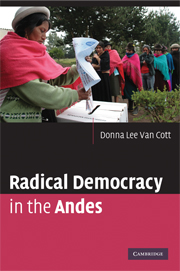Book contents
- Frontmatter
- Contents
- Acknowledgments
- List of Acronyms
- 1 Introduction: The Political and Cultural Origins of Democratic Institutional Innovation
- 2 The Legal and Political Context for Municipal Reform in Bolivia and Ecuador
- 3 Mayoral Leadership and Democratic Institutional Innovation
- 4 Political Parties, Civil Society, and Democratic Institutional Innovation
- 5 Institutional Innovation in Ecuador
- 6 Institutional Innovation in Bolivia
- 7 Conclusion: An Interaction Model of Democratic Institutional Innovation
- References
- Index
3 - Mayoral Leadership and Democratic Institutional Innovation
Published online by Cambridge University Press: 05 September 2012
- Frontmatter
- Contents
- Acknowledgments
- List of Acronyms
- 1 Introduction: The Political and Cultural Origins of Democratic Institutional Innovation
- 2 The Legal and Political Context for Municipal Reform in Bolivia and Ecuador
- 3 Mayoral Leadership and Democratic Institutional Innovation
- 4 Political Parties, Civil Society, and Democratic Institutional Innovation
- 5 Institutional Innovation in Ecuador
- 6 Institutional Innovation in Bolivia
- 7 Conclusion: An Interaction Model of Democratic Institutional Innovation
- References
- Index
Summary
Certainly all historical experience confirms the truth – that man would not have attained the possible unless time and again he reached out for the impossible. But to do that a man must be a leader, and not only a leader but a hero as well, in a very sober sense of the word.
Max Weber, “Politics as a Vocation” Gerth and Mills (1946a: 128)Durable radical democratic institutional innovations have this in common: an exceptional mayor to initiate the innovation, to guide it through its initial, rocky stages, and to ensure that it survives the innovating mayor's departure. Mayoral leadership was particularly important in Ecuador because mayors there have broader scope to initiate and design new institutions. In the most acclaimed Ecuadorian cases (Cotacachi and Otavalo) the innovating mayor is still in office after multiple terms. In contrast, there are several once-acclaimed cases (Guamote and Guaranda) in which a mayor oversaw the design and implementation of promising institutional innovations but then left office and the new government was unwilling or unable to sustain the institution – even though the replacement mayor was from the same party. The close correlation between the presence of the initiating mayor and sustained democratic institutional innovation underscores the importance of particular leaders to any explanation of the conditions for beneficial reform.
To a social scientist seeking generalizable conditions that could point us toward replicable solutions for troubled, conflictual democracies, the apparent need for highly qualified leaders is frustrating.
- Type
- Chapter
- Information
- Radical Democracy in the Andes , pp. 58 - 94Publisher: Cambridge University PressPrint publication year: 2008



